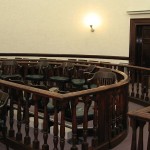Judge Sumi Does Her Job
 Judge Maryann Sumi issued the long anticipated opinion in Ozanne v. Fitzgerald yesterday, holding: 1) that the circuit courts have jurisdiction to hear cases alleging that a particular piece of legislation was not constitutionally enacted; 2) that the court’s jurisdiction includes challenges alleging noncompliance with Wisconsin’s Open Meetings Law; and that 3) the failure of the March 9, 2011 Joint Committee of Conference Meeting to comply with the Open Meetings Law rendered the legislative action taken at that meeting — 2011 Wisconsin Act 10 — void.
Judge Maryann Sumi issued the long anticipated opinion in Ozanne v. Fitzgerald yesterday, holding: 1) that the circuit courts have jurisdiction to hear cases alleging that a particular piece of legislation was not constitutionally enacted; 2) that the court’s jurisdiction includes challenges alleging noncompliance with Wisconsin’s Open Meetings Law; and that 3) the failure of the March 9, 2011 Joint Committee of Conference Meeting to comply with the Open Meetings Law rendered the legislative action taken at that meeting — 2011 Wisconsin Act 10 — void.
Judge Sumi’s opinion is straight forward. The logic of her reasoning is spelled out in the topic headings contained in the opinion’s table of contents. I paraphrase:
It is within the scope of judicial responsibility to review legislative action for compliance with statutory and constitutional requirements. The Open Meetings Law presumes that all governmental meetings will be open and subject to notice requirements. Legislative proceedings are not exempted from the requirements of the Open Meetings Law. Therefore the legislature must comply with the same Open Meeting rules that apply to other governmental entities. The evidence at trial demonstrated that the March 9, 2011 meeting did not comply with the Open Meetings Law. The Open Meetings Law authorizes the court to void actions undertaken in violation of the law’s terms, where the court finds that the public interest does not counsel in favor of sustaining the action. There is no public interest in favor of sustaining the act taken here, especially since the provisions of 2011 Wisconsin Act 10 can easily be re-enacted by the legislature if it so wishes (provided that any legislative re-enactment complies with the requirements of the Open Meetings Law).
Reading through this summary, one might wonder what all the fuss is about.

